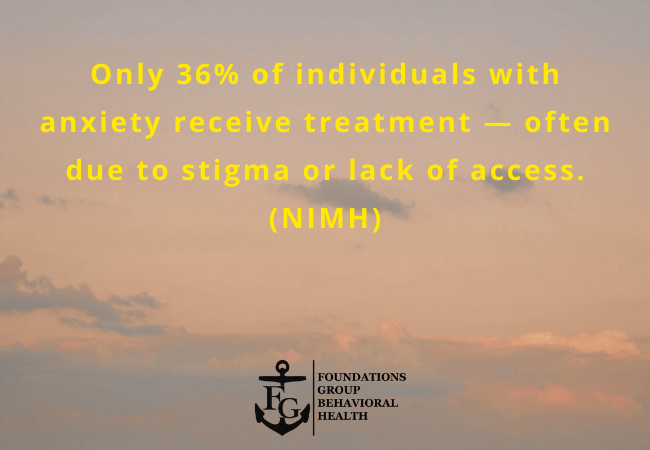If you’ve ever felt overwhelmed by constant worry, panic attacks, or social anxiety, you may have considered starting therapy. But not all therapy is created equal — especially when it comes to treating anxiety disorders that impact daily life.
While weekly therapy sessions (also called general or traditional therapy) can be effective for some, others require a more structured, focused, and multidisciplinary approach — like an anxiety treatment program.
At Foundations Group Behavioral Health, we offer a specialized Anxiety Treatment Program Massachusetts that goes far beyond the scope of traditional outpatient therapy. In this guide, we’ll explore how these programs differ, who they benefit, and how they fit within our Mental Health Treatment Programs Massachusetts.
Understanding Anxiety: Why Specialized Treatment Matters
Anxiety is the most common mental health disorder in the U.S., affecting over 40 million adults annually. It’s more than just worrying — it can cause intense fear, avoidance behaviors, panic attacks, sleep disturbances, racing thoughts, and even physical symptoms like chest tightness or dizziness.
Many people start with Outpatient Mental Health Therapy Massachusetts, but when anxiety becomes chronic, disabling, or co-occurs with depression or trauma, it often requires a more intensive, targeted solution.
That’s where a structured anxiety treatment program comes in.
What Is Regular Therapy?
Traditional therapy typically involves meeting one-on-one with a licensed therapist on a weekly basis. This format is flexible and ideal for:
- Mild anxiety or stress
- Adjustment-related issues (e.g., divorce, grief, job changes)
- Maintenance after higher levels of care
- People with strong support systems
Sessions focus on talk therapy and building coping skills over time. Many people benefit from this structure, especially when paired with Mental Health Therapy Massachusetts services like psychiatric care or medication management.
However, regular therapy is often limited in scope when someone’s anxiety begins to interfere with:
- Employment
- School attendance
- Social life
- Sleep or physical health
- Daily functioning
In these cases, stepping into a comprehensive, anxiety-specific treatment program provides a higher level of support.
What Is an Anxiety Treatment Program?
An anxiety treatment program is a structured, multidisciplinary plan designed specifically for individuals with moderate to severe anxiety disorders. These programs offer:
- Evidence-based therapies for anxiety
- Psychiatric evaluation and medication management
- Group therapy and peer support
- Skills training (e.g., distress tolerance, exposure therapy)
- Coordination with other treatment tracks (e.g., depression, trauma)
Programs may range in intensity:
- Outpatient Mental Health Therapy Massachusetts – 1–2 times/week
- Half Day Treatment Program Massachusetts – 3–5 days/week, part-day
- Psychiatric Day Treatment Massachusetts – 5 days/week, full-day clinical care
Each level is designed to match the severity of symptoms and functional impairment.
8 Ways Anxiety Programs Differ from Regular Therapy
1. Specialized Focus on Anxiety Disorders
In a standard therapy setting, your clinician may address a variety of concerns depending on what you bring to each session. In contrast, an anxiety treatment program is entirely focused on helping you overcome clinical anxiety — using methods backed by research.
Our Anxiety Treatment Program Massachusetts supports people with:
- Generalized Anxiety Disorder (GAD)
- Panic Disorder
- Social Anxiety Disorder
- Obsessive-Compulsive Disorder (OCD)
- Phobias
- PTSD (in conjunction with our Trauma Disorder Treatment Program Massachusetts)
2. Multidisciplinary, Team-Based Approach
Regular therapy often involves one provider. An anxiety treatment program includes an entire treatment team, such as:
- Licensed therapists
- Psychiatrists or psychiatric nurse practitioners
- Group facilitators
- Case managers
This team collaborates to build a personalized care plan, track progress, and adjust interventions in real time.
3. Integrated Medication Management
Medication is often essential for managing moderate to severe anxiety, especially when symptoms are interfering with daily life.
At Foundations Group Behavioral Health, medication is not an afterthought — it’s integrated into your plan, with:
- Initial psychiatric evaluation
- Ongoing symptom monitoring
- Adjustments based on therapy feedback
- Education on risks, benefits, and side effects
In contrast, regular therapy may require you to coordinate medication services separately, which can delay your progress.
4. Structured Scheduling and Daily Reinforcement
While traditional therapy might meet once per week, an anxiety program offers repetition and reinforcement, which are essential in retraining anxious thinking and behavior.
For example, in our Half Day Treatment Program Massachusetts, you might attend:
- Morning check-in group
- A CBT skills group
- Individual therapy session
- Medication check-in
- Mindfulness or grounding exercise
This structure helps you build and apply new habits faster, shortening the time it takes to feel better.
5. Inclusion of Group Therapy and Peer Support
One of the biggest differences between general therapy and an anxiety program is group support.
Group therapy gives clients the chance to:
- Share experiences
- Practice communication
- Get feedback in real time
- Realize they’re not alone
Whether you’re working on social anxiety, panic disorder, or general anxiety, groups are incredibly effective for exposure, connection, and confidence building.
6. Exposure Therapy and Real-World Practice
In traditional therapy, you may talk about fears and triggers. But in an anxiety treatment program, we guide you through exposure exercises that help desensitize your fear responses over time.
Examples:
- Practicing social situations in groups
- Gradual exposure to feared environments
- Role-playing feared conversations
- Interoceptive exposure (simulating panic symptoms to reduce fear of them)
These techniques are essential for clients with phobias, OCD, or panic-related symptoms.
7. Co-Occurring Disorder Support
Many people living with anxiety also experience:
- Depression
- Trauma or PTSD
- Substance use
- Eating disorders
Our Mental Health Treatment Programs Massachusetts allow for integrated support across multiple diagnoses. That means you’ll have access to our Depressive Disorder Treatment Program Massachusetts, Trauma Disorder Treatment Program Massachusetts, or medication-assisted recovery when needed — all under one coordinated care plan.
8. Clear Goals, Progress Monitoring, and Aftercare Planning
In traditional therapy, treatment is often open-ended. In anxiety treatment programs, your progress is actively tracked using:
- Symptom scales (e.g., GAD-7, PHQ-9)
- Weekly treatment team reviews
- Structured goals and benchmarks
- Discharge planning and aftercare support
This ensures that you graduate with confidence, knowing how to maintain your progress long after the program ends.

Is an Anxiety Program Right for You?
You may benefit from a structured anxiety program if:
- You’ve tried therapy but still feel stuck
- You experience panic attacks, agoraphobia, or avoidant behaviors
- Anxiety is affecting your work, school, or relationships
- You have co-occurring depression or trauma
- You’ve been hospitalized or in crisis
- You’re transitioning from inpatient care
We’ll help you determine the right level of care — whether that’s Outpatient Mental Health Therapy Massachusetts, Half Day Treatment, or Psychiatric Day Treatment Massachusetts.
Why Choose Foundations Group Behavioral Health for Anxiety Treatment?
At Foundations Group Behavioral Health, we understand how deeply anxiety can affect your life — from sleepless nights and racing thoughts to social isolation and panic attacks. That’s why we’ve built a program that’s more than therapy — it’s a complete solution.
Here’s what sets us apart:
Specialized Care for Anxiety Disorders
Our Anxiety Treatment Program Massachusetts is designed specifically for individuals experiencing generalized anxiety, panic attacks, social anxiety, OCD, and phobias. We don’t treat anxiety as a symptom — we treat it as the primary focus with targeted care.
Flexible Levels of Care That Grow With You
From weekly Outpatient Mental Health Therapy Massachusetts to structured Half Day Treatment or intensive Psychiatric Day Treatment Massachusetts, we offer a full spectrum of care — all under one roof. You can step up or down in intensity without switching providers.
Clinically Proven, Customized Therapies
Our programs combine the best evidence-based therapies — CBT, DBT, exposure therapy, mindfulness — delivered by licensed clinicians with expertise in anxiety treatment.
Integrated Medication Management
You don’t need to navigate psychiatry separately. Our anxiety program includes full access to psychiatric providers who work with your therapy team to ensure medication and therapy go hand-in-hand.
Whole-Person, Trauma-Informed Support
We recognize the role trauma and co-occurring disorders play in anxiety. That’s why we offer access to our Trauma Disorder Treatment Program Massachusetts and Depressive Disorder Treatment Program Massachusetts as part of your care plan.
Compassionate, Collaborative Providers
Our team is here to listen, guide, and walk alongside you — not lecture or diagnose from a distance. You’ll be met with empathy, expertise, and a clear roadmap toward recovery.
Support That Continues After You Graduate
We help you build the skills to manage anxiety long-term — and we stay by your side through aftercare, outpatient therapy, and relapse prevention planning.
Conclusion
Traditional therapy is an excellent starting point for many. But when anxiety begins to take over your life, it’s time to consider a specialized anxiety treatment program — one that gives you the structure, skills, and expert support to truly overcome it.
At Foundations Group Behavioral Health, our Anxiety Treatment Program Massachusetts is built on science, compassion, and personalization. Whether you need weekly outpatient therapy or a full-day support plan, we’ll help you take back control of your life. Call us today at 888.685.9730 to schedule a confidential assessment and learn which anxiety treatment path is right for you.
FAQ on Anxiety Treatment Program vs. Regular Therapy
What is the main difference between regular therapy and an anxiety treatment program?
Regular therapy typically involves one-on-one weekly sessions with a generalist therapist. An anxiety treatment program offers a comprehensive, structured approach using specialized therapies, group support, medication management, and coordinated care — ideal for moderate to severe anxiety.
Who needs an anxiety treatment program instead of outpatient therapy?
If anxiety interferes with your job, relationships, or daily functioning — or if you’ve tried weekly therapy with limited results — a structured anxiety program may offer the depth and intensity needed for recovery.
What therapies are used in your Anxiety Treatment Program Massachusetts?
We use evidence-based approaches such as Cognitive Behavioral Therapy (CBT), Dialectical Behavior Therapy (DBT), Exposure Therapy, Mindfulness-Based Cognitive Therapy (MBCT), and Acceptance and Commitment Therapy (ACT), tailored to each individual.
Does the program include medication?
Yes. Our programs integrate psychiatric evaluation and ongoing medication management to complement therapeutic progress. This ensures your treatment is safe, cohesive, and responsive.
How often are sessions held in a treatment program?
Depending on your needs, you may attend several sessions a week. Options include Half Day Treatment Program Massachusetts (partial days) or Psychiatric Day Treatment Massachusetts (full days, 5x/week).
Is group therapy part of the program?
Yes. Group therapy offers peer support, skills development, and social confidence — and is a core component of our anxiety programs.
Can I switch to regular therapy after the anxiety program ends?
Absolutely. We provide a smooth step-down process, transitioning clients to Outpatient Mental Health Therapy Massachusetts for continued support as symptoms improve.








